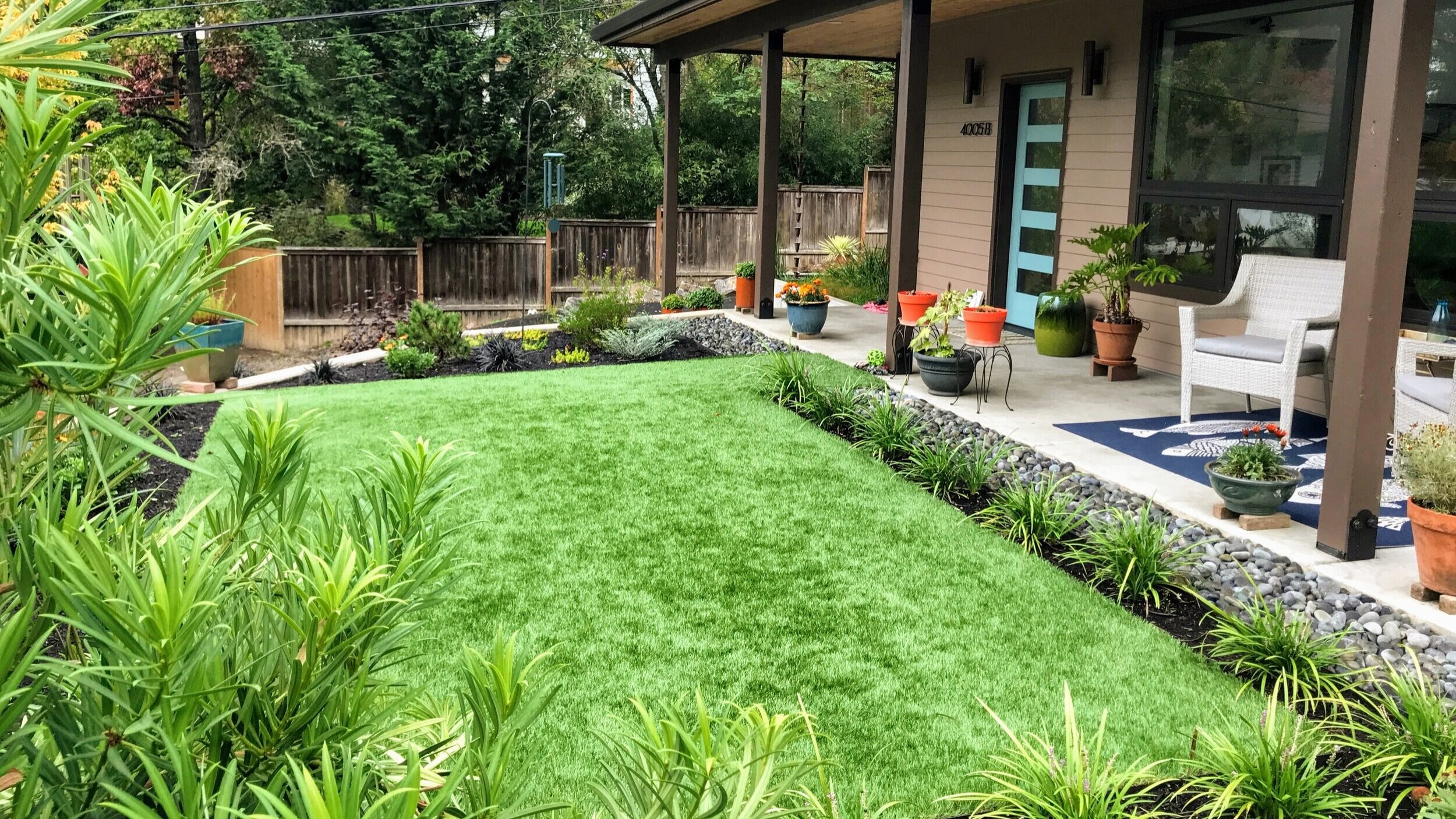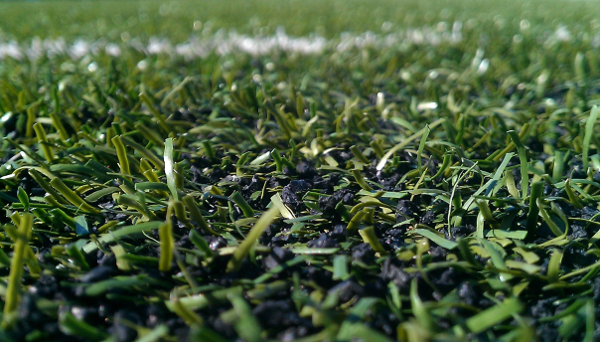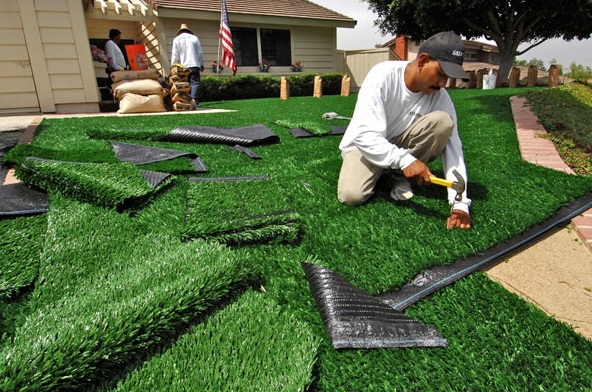Find Trusted Artificial Turf Companies Phoenix for High-Quality and Realistic Grass
Find Trusted Artificial Turf Companies Phoenix for High-Quality and Realistic Grass
Blog Article
Delve Into the Environmental Advantages of Opting for Synthetic Grass Solutions
The fostering of synthetic lawn solutions offers an engaging chance to resolve pushing environmental challenges. By significantly reducing water use and decreasing the application of harmful chemicals, these alternatives not only advertise lasting landscaping however also protect neighborhood communities. The lower carbon impact linked with reduced upkeep tasks contributes to a more lasting approach to land monitoring. Nonetheless, the ramifications of these advantages expand past mere conservation efforts, raising inquiries about their lasting effect on habitat preservation and overall eco-friendly balance. Discovering these measurements discloses an intricate interplay worth thinking about.
Water Preservation Conveniences
One of the most significant benefits of artificial grass is its ability to conserve water. In comparison, man-made lawn does not need watering, substantially minimizing the overall demand for water sources.
By getting rid of the requirement for normal watering, man-made turf adds to sustainable landscape techniques and helps minimize the environmental effect of too much water consumption. In addition, the conservation of water reaches the reduction of overflow, which can bring about soil erosion and waterway pollution.
In addition, the installment of man-made turf permits municipalities and house owners to assign water sources much more successfully, focusing on vital usages such as alcohol consumption water and agriculture. The change towards synthetic grass not only promotes liable water use however additionally straightens with more comprehensive environmental objectives intended at protecting natural sources.
As communities progressively prioritize sustainability, the water conservation advantages of synthetic grass present an engaging instance for its fostering in industrial and residential landscaping tasks.
Minimized Chemical Usage
The transition to synthetic grass significantly lowers the dependence on chemical treatments commonly utilized in all-natural grass maintenance. Typical grass management normally involves the application of herbicides, pesticides, and plant foods to advertise growth and control bugs. These chemicals can position threats to human wellness, local wild animals, and the setting, contributing to soil and water contamination.
On the other hand, synthetic lawn gets rid of the demand for these hazardous materials. When mounted, it requires marginal upkeep, largely including routine cleansing and infrequent infill replenishment. This decrease in chemical usage not only profits the instant setting but also adds to more comprehensive environmental security. By lessening the launch of synthetic compounds right into the ecological community, synthetic grass advertises much healthier soil and water supply.
Furthermore, the absence of chemical runoff connected with man-made turf setups aids shield neighborhood rivers from air pollution, sustaining marine life and keeping biodiversity. Turf installation phoenix az. As communities progressively prioritize sustainable practices, deciding for synthetic grass presents a feasible option that lines up with environmental preservation objectives. Via this change, home proprietors can enjoy lush environment-friendly rooms without compromising environmental health, leading the way for a more sustainable future
Lower Carbon Impact

Additionally, the installment of synthetic grass can result in considerable water preservation. Natural yards require significant quantities of water for watering, which not only includes in the carbon impact associated with water extraction Full Report and treatment yet likewise strains regional water resources. On the other hand, synthetic grass requires minimal maintenance, needing no watering, thereby substantially reducing water usage and its connected power costs.
Furthermore, the long life of artificial grass contributes to its reduced carbon impact. With a life expectancy of up to 15 years or even more, the need for frequent substitutes is reduced, causing much less waste and reduced power intake in production and throwing away typical grass choices. Overall, synthetic grass presents a lasting alternative for eco aware landscape design.
Habitat Conservation
Habitat preservation is an important factor to consider in the debate over landscaping selections, specifically when comparing man-made grass to natural grass. Natural yard yards often call for considerable maintenance, including the usage of herbicides, pesticides, and plant foods, which can adversely affect regional environments. These chemicals can seep right into the dirt and waterways, harming indigenous plants and fauna and disrupting neighborhood habitats.
On the other hand, synthetic turf offers a chance to reduce the ecological impact of landscaping. By selecting artificial turf, home owners can reduce the disruption of all-natural environments associated with traditional yard treatment practices. Synthetic grass gets rid of the need for unsafe chemicals, thus safeguarding nearby wild animals and maintaining the honesty of bordering communities. In addition, the installation of synthetic grass can lead to the conversion of former lawn locations right into more biodiverse landscapes, such as pollinator gardens or indigenous plant locations, which can support local wildlife.
Eventually, the shift to fabricated turf not only conserves water and reduces maintenance initiatives however likewise fosters a more unified connection between human activities and the native environment, advertising environment conservation in the procedure.
Long-Term Sustainability
Long-term sustainability is an essential variable in reviewing the benefits of fabricated grass over standard turf lawns. Among one of the most considerable benefits of synthetic grass is its toughness; it can last as much as 15-20 years with minimal upkeep, whereas natural yard needs frequent click to read more reseeding and substitute. This longevity lowers the requirement for constant resources, such as water, fertilizers, and pesticides, which are vital for maintaining a healthy and balanced grass yard.
Furthermore, synthetic lawn adds to a reduction in carbon exhausts connected with grass care tools. Standard lawns commonly require gas-powered mowers, leaners, and blowers, all of which add to air contamination. Phoenix turf companies. In contrast, synthetic grass eliminates the demand for such equipment, promoting a cleaner atmosphere
In addition, the production of fabricated turf progressively makes use of recycled materials, enhancing its sustainability account. As manufacturers adopt eco-friendly practices, the ecological impact of synthetic grass remains to lessen.

Verdict
The Home Page fostering of synthetic grass remedies provides considerable environmental advantages, including substantial water conservation, minimized dependence on harmful chemicals, and a lower carbon footprint. Fabricated turf aids in preserving all-natural environments by reducing land disruption and promoting long-term sustainability via the usage of resilient materials. Jointly, these elements underscore the potential of synthetic grass to contribute positively to environmental wellness and use a sensible option to standard landscaping practices in an increasingly resource-conscious globe.
In contrast, synthetic turf does not require watering, dramatically minimizing the overall demand for water resources. By lessening the release of artificial substances right into the ecosystem, synthetic lawn promotes healthier dirt and water systems.
Additionally, the installation of man-made turf can result in significant water conservation. In comparison, synthetic lawn needs marginal maintenance, needing no watering, thereby considerably minimizing water usage and its linked energy expenses.

Report this page